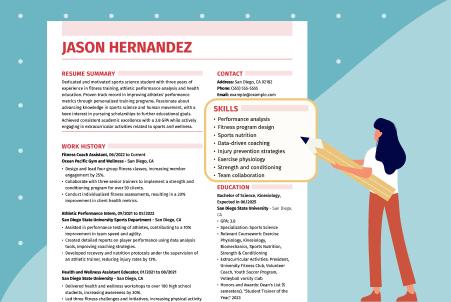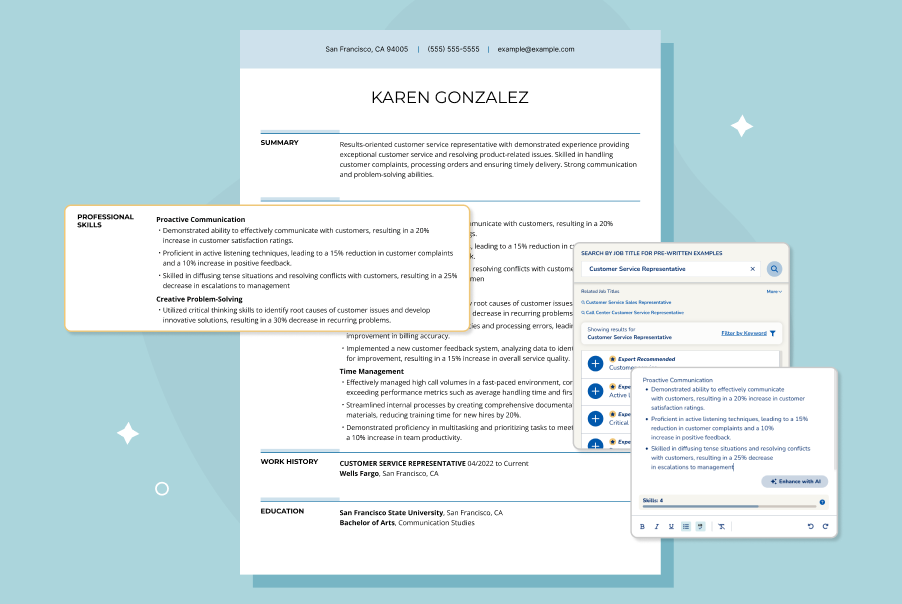Our customers have been hired at: *Foot Note
Table of Contents
Get started with MyPerfectResume today!
- Build a resume on any device
- Pick an ATS-friendly template
- Tailor with AI copy suggestions
Searching for a job can feel both exciting and overwhelming, especially in a competitive market where roles fill quickly and expectations are high.
Whether you’re starting fresh, returning after some time away, or exploring a new direction, every job search comes with its own unique challenges—and opportunities.
In this guide, we’ll share practical job search tips to help you stand out, stay motivated, and navigate your search with clarity, confidence, and purpose.
Essential Job Search Strategies
1. Set clear goals before you start
Before you start applying, take time to reflect on what you want in your next role. Consider the kind of work you enjoy, the skills you want to use, and the type of environment you thrive in.
You can explore job satisfaction trends to help you clarify your priorities and ensure you're focusing on opportunities that align with your career goals and values.
This clarity will help guide your search and ensure you're focusing on opportunities that align with your career goals and values.
2. Tailor your application materials
Submitting the same resume and cover letter for every job might save time, but it won’t help you stand out. Hiring managers can easily spot a generic application, and they’re more likely to pass it over in favor of candidates who tailored their materials to the role.
To tailor your application, start by analyzing the job posting you want to apply for. Look for key phrases, required skills, and any specific qualifications the employer emphasizes. Then, customize your resume by mirroring that language and showcasing your most relevant experience.
Your cover letter should also reflect a personalized approach. Mention the company by name, highlight what excites you about the role, and explain how your experience makes you a great fit. For a polished application, choose matching resume and cover letter templates to give your documents a cohesive, professional look.
You can use our AI Resume Builder to easily create a targeted resume with pre-written content tailored to different industries and roles.
3. Grow your professional network
Engaging with others professionally helps you stay informed, discover hidden job leads, and gain valuable insights into different companies and roles.
Here are a few networking insights and tips to help you get started:
- Attend industry events and conferences: These settings offer natural opportunities for conversation, learning, and making meaningful connections with industry professionals.
- Join LinkedIn groups: Sharing insights, asking questions, and engaging in discussions helps you connect with others and establish your presence in the field.
- Engage with company pages and professionals: Interacting with their posts and updates keeps you visible and informed while showing genuine interest in their work.
- Be curious and authentic: Prepare your elevator pitch, but also prepare thoughtful questions to build lasting relationships rather than transactional connections.
- Volunteer or join professional associations: Getting involved in these communities increases your visibility and opens doors to resources and networking opportunities.
- Participate in webinars and online workshops: Following up with speakers or attendees can turn shared learning into lasting connections.
- Create and share valuable content: Posting insights, tools, or helpful resources demonstrates your expertise and draws like-minded professionals to your profile.
4. Leverage existing connections
Consider reaching out to former colleagues, classmates, supervisors, or even friends who work in your target industry. Let them know what kind of roles you're looking for and ask if they’d be open to a quick chat or willing to keep an ear out for openings.
Be specific about how they can help—mention companies you’re interested in or roles you're qualified for. If someone offers to refer you or connect you with someone else, follow up quickly and professionally.
An introduction or internal referral can significantly improve your chances of getting noticed. Remember to send a thank-you note or a follow-up message to share your progress. Keeping your existing network engaged can make all the difference in your job search.
5. Use online job boards strategically
Online job boards are an excellent resource for discovering openings, but to use them effectively, you need more than just a “quick apply” mindset. Instead of applying to every listing that looks remotely relevant, prioritize roles that truly align with your experience, skills, and career goals.
Set up job alerts to receive new postings that match your criteria. Doing this saves time and ensures you’re among the first to apply. Remember to tailor your resume and cover letter for each application, even when using quick-apply features.
Take advantage of filters to narrow down listings by location, salary range, job type, and experience level. Don’t forget to explore niche job boards or career sites focused on your specific industry—they often feature more targeted opportunities.
Our sister company, FlexJobs, updates verified remote job listings daily and offers helpful filters to narrow down your job search.
6. Explore job fairs and hiring events
Job fairs and hiring events can be powerful tools in your job search, offering direct access to employers who are actively hiring.
These events allow you to introduce yourself face-to-face (or virtually), make a memorable impression, and gather valuable information about different companies and roles.
Before attending, research the participating employers and prepare a few talking points tailored to each one. Explore our job fair checklist for a detailed guide on how to get ready for your next career fair.
A confident introduction can go a long way in making you stand out. Bring multiple copies of your resume, and dress professionally, even for virtual events.
Send a quick thank-you message or connection request on LinkedIn to anyone you spoke with, and express interest in continuing the conversation.
7. Strengthen your online presence
In today’s digital world, your online presence is often the first impression employers get, so make sure it works in your favor. A strong online presence reinforces your qualifications and helps you stand out in a crowded job market.
Start by updating your LinkedIn or Bold.pro profile to reflect your most recent experience, skills, and accomplishments. Use a professional photo, write a compelling headline, and craft a summary that highlights what you bring to the table.
Consider posting or sharing content relevant to your industry to show that you’re engaged and knowledgeable. Even commenting on others’ posts can boost your visibility and demonstrate your interest in the field.
If you’re in a creative or tech field, consider building an online portfolio or personal website to showcase your work and support your personal brand. You can also add your resume to LinkedIn so that recruiters can access it easily.
8. Prepare for interviews with confidence
Whether in person or virtual, preparing for interviews in advance will help you feel more confident, communicate clearly, and leave a lasting impression. Here are a few tips:
- Research the company and role: Learn about the company’s mission, values, and recent news, and study the job description closely. This will help you tailor your answers and show that you’re genuinely interested in the opportunity.
- Practice your responses: Rehearse answers to common questions like “Tell me about yourself” and “Why do you want this job?” Use the STAR method (Situation, Task, Action, Result) to give clear, structured answers that highlight your strengths.
- Prepare a few thoughtful questions: Asking about the company culture, team dynamics, or growth opportunities shows that you’re engaged and thinking ahead, not just looking for any job.
- Review your resume and get comfortable talking about your experience: Be ready to explain how your background connects to the role, and highlight specific accomplishments that demonstrate your value.
9. Stay organized and set achievable goals
A successful job search takes time, focus, and resilience, and staying organized is key. Without a system, it’s easy to lose track of where you’ve applied, miss follow-ups, or feel overwhelmed.
Start by creating a simple tracker (such as a spreadsheet) to record job titles, companies, application dates, follow-up notes, and interview outcomes.
Set small, manageable goals each week—like applying to five targeted jobs, reaching out to three new contacts, or updating your resume one section at a time.
10. Keep growing while you search
Investing in yourself during the job search shows employers you’re proactive, curious, and serious about growing in your career.
Consider taking a short online course, earning a certification, or brushing up on in-demand professional skills related to your field.
Free or low-cost platforms like Coursera, LinkedIn Learning, and edX offer flexible options you can fit into your schedule.
If you're between jobs, volunteering or freelancing can be a great way to upskill, build experience, expand your network, and show initiative.
Job Search Mistakes To Avoid
- Focusing on quantity over quality: Applying to dozens of jobs in a day can lead to burnout and fewer responses. Focus on roles that truly fit your skills and interests—and put effort into each application.
- Skipping the cover letter: Even if it’s optional, a well-written cover letter gives you a chance to connect your experience directly to the role. Skipping it can be a missed opportunity to make a strong impression.
- Overlooking typos or formatting issues: Small errors can leave a big, negative impression. Proofread your application materials and make sure your resume layout is clean and easy to read. You can use our ATS Resume Checker to scan for common issues.
- Not following up: After interviews or networking conversations, failing to follow up can signal a lack of interest. A quick thank-you note or follow-up email after an interview can reinforce your enthusiasm and professionalism.
- Limiting your search to job boards: While job boards are a great starting point, relying on them alone can narrow your opportunities. Many roles are posted on company websites, niche industry sites, or shared within professional communities.
How To Stay Motivated During Your Job Search
Job searching can be emotionally draining, so build in time for rest and self-care. Explore strategies below for staying motivated throughout the job search process.
Celebrate your wins
Celebrating your wins helps keep your morale high and your momentum strong during the ups and downs of the search.
Landing an interview, making a new connection, updating your resume, or even hitting “send” on a tailored application are all meaningful achievements.
Recognizing these moments reinforces that your effort is moving you closer to your goal, even if the job offer hasn’t come through yet.
Create a support system
Job searching can feel isolating, so it’s important to stay connected with people who can offer encouragement, advice, and perspective.
Talk to friends, family members, or peers who are also job hunting—they’ll understand what you’re going through and may even share helpful tips or leads. Joining online communities, forums, or local job search groups can also help you feel supported and stay motivated.
Surrounding yourself with positive, understanding people will remind you that you’re not alone—and that support makes a big difference when things get tough.
Build a balanced routine
Treat your job search like an important part of your day, but not your entire day. Creating a consistent routine, even if it’s flexible, helps you stay organized, focused, and mentally sharp.
Set aside dedicated time for searching, networking, and applying, then give yourself permission to step away. Take breaks to rest, get outside, or do something creative to recharge.
You don’t need to be job searching 24/7 to be successful. Giving your mind space to reset can lead to better ideas, stronger applications, and a more sustainable search overall.
Focus on What You Can Control
It’s easy to get discouraged by things outside your control, like unanswered applications or unexpected rejections.
Instead of fixating on outcomes, shift your energy to what you can influence: the quality of your resume, how you prepare for interviews, and how consistently you show up for your search.
Track your progress, refine your materials, keep learning, and build meaningful connections. Focusing on your effort, not just the end result, helps you stay grounded, motivated, and resilient.
Key Takeaways
- Clarity is your compass: Define what you’re looking for before you start applying—knowing your goals helps you target the right opportunities.
- Customization gets results: Tailoring your resume and cover letter to each job makes you stand out and shows employers you're genuinely interested.
- Networking opens hidden doors: To maximize your chances, combine job boards with networking, direct outreach, and targeted research.
- Consistency beats intensity: A steady, focused approach to applying and following up is more effective than occasional bursts of effort.
- Mindset matters: Rejections happen, but resilience and self-care help you stay motivated, confident, and ready for the right opportunity.
FAQ
How many jobs should I apply for each week?
The number of jobs you should apply for depends on your availability and how tailored your applications are, but a strong goal is around 10-15 quality applications per week.
If you’re job hunting full-time, you might aim for closer to 15-20, while someone balancing a job or other responsibilities may find five to 10 more realistic.
The key is to focus on quality over quantity, customizing your resume and cover letter for each role instead of sending out generic applications.
Make sure to also spend time networking, researching companies, and following up on applications, as these activities can be just as valuable as applying itself.
What are the best job search tips for older workers?
Older job seekers should highlight their experience, adaptability, and reliability. Focus on recent accomplishments, up-to-date skills, and your ability to work with diverse teams.
Start by highlighting your most recent and relevant experience. A resume for older workers should focus on the past 10-15 years of relevant experience.
Emphasize adaptability and technical skills, especially if you’re applying for roles in fast-moving industries. Mention specific tools, platforms, or systems you’ve used.
Don’t shy away from addressing your experience with confidence—it’s a strength, especially when paired with a willingness to keep learning and growing.
How long does the job search usually take?
The length of a job search can vary widely depending on your industry, experience level, location, and how much time you’re able to dedicate to it. On average, it takes about three to six months to land a new job.
Some people may find something sooner, especially if they’re in a high-demand field, while others may take longer, particularly if they’re changing careers, seeking a more senior role, or navigating a competitive market.
A lot happens behind the scenes during the hiring process. After applying, it can take weeks for employers to review resumes, schedule interviews, and make decisions. It’s important to continue applying, networking, and following up while waiting to hear back.
What should I do if I’m not hearing back?
It’s frustrating to send out applications and get radio silence, but don’t get discouraged. Start by reviewing your resume and cover letter. Are they tailored to each job? Do they clearly show how your experience matches the role? If not, take time to customize them using relevant keywords from the job description and highlight measurable achievements.
Also, take a look at the types of roles you’re applying for. Are you a strong fit for the qualifications listed, or are you stretching too far or not far enough? Sometimes, a few adjustments to your search criteria can make a big difference.
If you’ve applied and haven’t heard back after a week or two, don’t be afraid to follow up on your job application with a polite email expressing continued interest. It shows initiative and keeps you on their radar. Consistency, persistence, and a well-organized strategy make a big difference in keeping your momentum strong throughout the search.
Should I apply for a job if I don’t meet all of the requirements?
Yes, if you meet about 70-80% of the qualifications, it’s still worth applying. Many job descriptions are more like a wish list than a strict checklist, and employers often expect candidates to grow into a role.
Use your application to highlight transferable skills, past achievements, and your willingness to learn. Confidence and a tailored application can make a strong impression, even if your experience doesn’t check every box.
Explore our career guide for people with disabilities for additional insights into inclusive hiring practices and tailored job search tips.
Our customers have been hired at:*Foot Note













